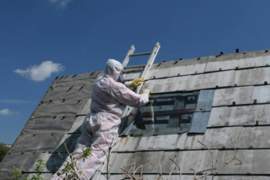
South Carolina Asbestos Laws

Must Read
As is the case with many coastal states, shipyards are a major source of asbestos contamination in the state. This, along with the mining of vermiculite and the textile industry, have given South Carolina an average number of asbestos related illnesses when compared to the rest of the country. The South Carolina Department of Health and Environment is the leading compliance and enforcement agency for South Carolina asbestos laws. This agency will certify and license a number of asbestos professionals, each serving different functions. In addition, the SCDHEC will provide information to the public about asbestos in the home, regulate asbestos abatement in the state and provide the forms necessary to carry out the demolition or renovation of any large structure subject to South Carolina asbestos laws. Contamination sites in South Carolina Shipyards that used asbestos are particularly dangerous to those that worked there. Ships are confined spaces and during construction tend to be poorly ventilated. When adding these factors to the sprayed application of asbestos fibers, conditions in the ship were a definite hazard with a high concentration of fibers. Asbestos in ships were used to fireproof and waterproof proof surfaces and machinery. Sailors and those that did repairs on these ships post-construction may have also been exposed to asbestos containing materials. The textile industry also used asbestos extensively, especially after World War II. Asbestos was an excellent insulator that did not conduct electricity. These insulation applications are friable however and as such, many factory workers were not protected from these small fibers. Those that worked there may develop respiratory problems at a later date. Asbestos in the home Homes pose the greatest current risk to South Carolina residents, as most of the asbestos material used for these structures remains intact. Many applications of asbestos in the home remain safe, as they are non-friable and unlikely to be released into the air, where it will pose a health risk. The friable applications however, which include insulation, plaster and ceiling coatings, should be removed as quickly as possible, as these applications gradually crumble and release dangerous fibers. Demolitions will require the removal of all asbestos containing material if it can be crumbled or compromised during the process. This includes many indurate, non-friable applications. Renovations may leave some non-friable applications as long as that area of the structure is not undergoing renovation. Asbestos inspection To ensure you comply with South Carolina asbestos laws, you will need to find a South Carolina asbestos inspector, licensed by the state essential. The Asbestos Control Program will maintain a listing of these inspectors and these inspectors will identify ACMs through testing and recommend a course of action. Asbestos litigation South Carolina law is structured to discourage personal injury lawsuits. This makes suing for damages substantially difficult due to a high burden of proof placed on the plaintiff. Those that wish to sue for damages in South Carolina must have a verifiable asbestos related illness and provide painstaking evidence of exposure and the nature of that illness in order to file a lawsuit.



















